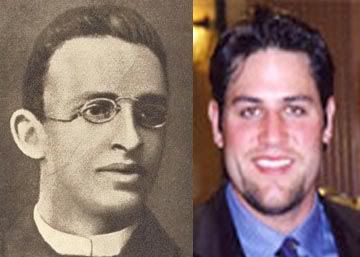skip to main |
skip to sidebar
Alexander and Lance Berkman: Separated At Birth, Part 3
In 1982, Lance Berkman's family moved to Austin, and the boy’s baseball training intensified. Back then, conventional wisdom held that young players shouldn’t lift weights. But Larry, Lance's father, remembered meeting a scout when he was at UT who suggested that arm strength could be built safely and effectively in kids by having them swing a bat at a tire. So he hung a tire from a tree and told Lance to take 100 cuts—50 lefthanded and 50 righthanded—each day after school.
Because tires have more mass than baseballs do, Lance had to drive through the hitting zone with a lot of energy just to complete his swings. This gave him strength other boys did not possess. He also hit off a tee, helping him to hone his mechanics. And mechanics were everything to Lance. He devoted his weekends to his swing—both lefty and righty—throughout his childhood and teens years, spending countless hours in the batting cages when his friends were goofing around and having fun.
When Alexander Berkman started to avenge the Homestead strikers he knew a deed like that could only be paid for by his death and he was ready to sacrifice his young life without hesitation for his outraged sense of justice. Berkman tried to assassinate Henry Clay Frick, steel mogul whose private detectives killed 10 of his striking employees. Alex shot Frick three times and then stabbed him with a curare-tipped dagger before he was overcome by his bodyguard. Unfortunately (and miraculously) Frick survived.
Perhaps if Alexander had practiced on tires, to gain strength like Lance did, he would have succeeded with the stabbing.
No matter how one evaluates his deed, none would doubt his sincerity if one only had the patience to delve into the complicated soul of humanity and guess its secrets. When a person, particularly a young man whose life still has everything to offer, is ready to risk his all without hope of return, he must not be evaluated by ordinary standards. This is a deed which can only be explained when its motives are appreciated. He who does not understand how one could give everything for a cause which bore for him the whole meaning of life, will never understand a person like Berkman. The average philistine who calculates his life by profit and loss, and whose hardened soul cannot understand any action which is not motivated by the desire for profit, will never see in people like Berkman other than brutal force who menace the existence of society. They will never comprehend that it was not crudeness of sentiment that made Berkman commit his deed, but that it was his love for humanity, his respect for human life, that impelled him to take a life. This rare trait was characteristic of Berkman to his very end and was the key to his personality.







No comments:
Post a Comment